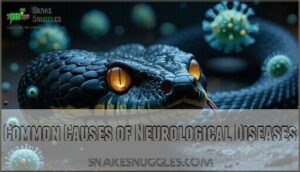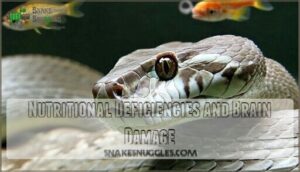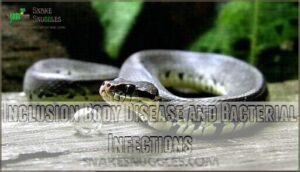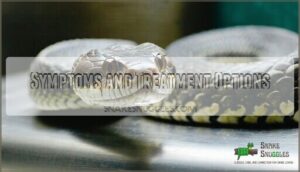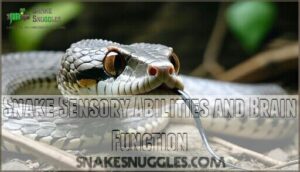This site is supported by our readers. We may earn a commission, at no cost to you, if you purchase through links.
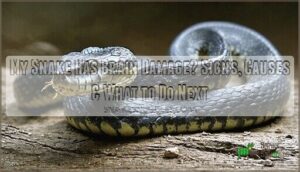 If you suspect your snake has brain damage, watch for telltale signs like loss of coordination, head tremors, unusual body positioning, or "stargazing" behavior where they twist their neck unnaturally.
If you suspect your snake has brain damage, watch for telltale signs like loss of coordination, head tremors, unusual body positioning, or "stargazing" behavior where they twist their neck unnaturally.
Your snake might also show decreased appetite, disorientation, or partial paralysis.
These neurological symptoms can stem from viral infections like Ophidian Paramyxovirus, bacterial infections, nutritional deficiencies (especially thiamine), or parasitic diseases.
Don’t panic, but don’t wait either—early veterinary intervention makes all the difference.
Some causes are treatable with proper care, while others require supportive management.
Understanding the specific triggers and treatment approaches can help you navigate this challenging situation with confidence.
Table Of Contents
- Key Takeaways
- Recognizing Neurological Issues
- Common Causes of Neurological Diseases
- Nutritional Deficiencies and Brain Damage
- Diagnosing Neurological Problems
- Stargazing Disease in Snakes
- Treating Neurological Issues
- Preventing Neurological Damage
- Snake Neurological Anatomy
- Snake Sensory Abilities and Brain Function
- Managing Snake Neurological Health
- Frequently Asked Questions (FAQs)
- How to tell if a snake has brain damage?
- What is stargazing syndrome in snakes?
- What is cloacitis in snakes?
- How to tell if a snake has neurological problems?
- Can snakes have trauma?
- What is stargazing disease in snakes?
- How do you treat septicemia in snakes?
- How does brain damage affect a snakes defensive behavior?
- Can a snakes brain damage be caused by improper care?
- What are the long-term effects of brain damage on snakes?
- Conclusion
Key Takeaways
- Watch for telltale signs early – You’ll notice head tremors, stargazing behavior, loss of coordination, muscle weakness, and appetite changes that signal potential brain damage requiring immediate attention.
- Multiple causes need different treatments – Viral infections like OPMV, bacterial issues, nutritional deficiencies (especially thiamine), and parasitic diseases all cause neurological symptoms but require specific veterinary approaches.
- Prevention beats treatment – You can avoid most neurological issues by providing proper nutrition, avoiding raw egg whites, maintaining clean environments, and scheduling regular vet checkups.
- Recovery varies but supportive care helps – While some brain damage is permanent, early intervention with proper hydration, pain management, and environmental control can improve your snake’s quality of life significantly.
Recognizing Neurological Issues
You’ll notice something’s off when your snake starts acting differently than usual.
Subtle changes in behavior, movement problems, or strange head movements can signal serious neurological issues that need immediate attention.
Subtle Changes in Behavior
Your snake’s subtle behavior changes can signal snake brain damage or cognitive dysfunction.
Watch for these early warning signs:
- Appetite Changes – refusing food or irregular feeding patterns
- Hiding Habits – avoiding usual shelter spots or excessive hiding
- Activity Levels – reduced movement or unusual lethargy during active periods
- Shedding Problems – incomplete sheds or stuck skin patches
These snake behavior changes often appear before obvious neurological symptoms, making early detection essential for effective snake veterinary care.
Movement Issues and Weakness
When your snake’s body betrays them, muscle atrophy and paralysis causes become obvious red flags.
Watch for abnormal posture, coordination loss, or gait abnormalities that signal snake neurological issues.
If you spot wobbly movements, weakness, or your snake can’t maintain normal positioning, snake brain damage might be the culprit behind these concerning snake abnormal movements.
Head tremors may also indicate serious neurological disorders.
Head Tremors and Unusual Postures
When your snake’s head starts trembling or its body contorts into abnormal positions, you’re seeing serious snake neurological problems.
These symptoms can include snake head tremors and opisthotonus (that dramatic back-arching pose), which signal potential snake brain injury.
Your snake’s trembling head and twisted posture signal a neurological emergency.
These neurological origin symptoms require immediate severity assessment – think of them as your snake’s version of a medical emergency that demands quick action.
Common Causes of Neurological Diseases
When your snake shows neurological symptoms, several infectious agents could be the culprit behind the brain damage.
These range from viral infections like Ophidian Paramyxovirus to bacterial, fungal, and parasitic invaders that can wreak havoc on your snake’s nervous system.
Viral Infections and Ophidian Paramyxovirus
Something’s off with your snake’s behavior? OPMV might be the culprit.
This highly contagious virus spreads through respiratory symptoms and viral shedding, especially under stress factors.
You’ll notice neurological issues like head tremors and stargazing.
Since ophidian paramyxovirus can devastate collections, strict isolation protocols are essential.
Early detection prevents widespread snake encephalitis outbreaks.
Bacterial Infections and Staphylococcus Aureus
When bacterial infections take hold, your snake’s neurological system becomes vulnerable.
Staphylococcus aureus targets immunocompromised snakes, causing serious complications:
- Staph Transmission spreads through contaminated environments and poor hygiene protocols
- Antibiotic Resistance makes treatment challenging, requiring specific medications
- Wound Infections create entry points for bacteria, leading to neurological infections
Immune Suppression from stress or illness increases susceptibility to snake encephalitis and brain damage.
Spinal osteomyelitis, another potential complication, is also associated with chronic bacterial infections.
This can be related to reptilian bacterial diseases.
Fungal Infections and Cryptococcus Neoformans
While bacterial infections attack through wounds, fungal infections like Cryptococcus neoformans sneak in through your snake’s respiratory system.
This sneaky pathogen causes neurological infections and snake brain damage symptoms including seizures and blindness.
Antifungal treatments often fail, making environmental control your best defense.
This is concerning, as cryptococcus causes invasive infections globally.
Keep enclosures clean and avoid contaminated soil to prevent cryptococcus transmission and protect immunocompromised snakes.
Parasitic Infections and Acanthamoebic Cephalitis
Unlike fungal threats, parasites like Acanthamoeba pose a sneaky danger to your snake’s brain. These microscopic troublemakers cause acanthamoebic cephalitis, leading to severe snake neurological issues and potential brain damage.
The Acanthamoeba lifecycle involves two stages:
- Trophozoites (active infection stage)
- Cysts (resistant survival form)
Parasite transmission occurs through contaminated water or soil, and the infection spreads to the CNS, causing snake brain damage. Treatment efficacy remains limited, making prevention strategies essential.
One key preventative measure is to watch for changes in appetite.
Nutritional Deficiencies and Brain Damage
Your snake’s diet might be quietly damaging its brain without you realizing it.
Poor nutrition, especially thiamine deficiency from improperly prepared fish or biotin problems from raw eggs, can cause serious neurological issues that mimic other diseases.
Thiamine Deficiency in Fish-Eating Snakes
Fish-eating snakes face a hidden danger lurking in their dinner bowls. Thiamine deficiency strikes when your snake’s diet consists mainly of fish containing thiaminase, an enzyme that destroys this essential vitamin. Early Symptoms appear as muscle twitching and coordination problems, while Prevention Strategies focus on proper Fish Preparation and Dietary Conversion.
Watch for these warning signs of thiamine deficiency:
- Head tremors and convulsions
- Inability to strike prey accurately
- Twisted neck posture (torticollis)
- General weakness and blindness
Thiamine Supplementation can reverse damage if caught early, making proper snake nutrition management critical for preventing neurological deficiencies.
Hypobiotinosis From Raw Egg Whites
While thiamine deficiency affects fish-eating snakes, Raw Egg Dangers from avidin pose another threat.
Raw egg whites contain avidin, which binds biotin and creates Biotin Absorption Issues. This leads to Hypobiotinosis Symptoms like weakness, head tremors, and paralysis.
Avidin in raw egg whites steals biotin from your snake’s system, triggering dangerous neurological symptoms.
Cook eggs thoroughly or choose Dietary Biotin Sources instead.
| Risk Factor | Safe Alternative |
|---|---|
| Raw egg whites | Cooked whole eggs |
| Avidin binding | Heat-denatured avidin |
| Biotin deficiency | Balanced snake nutrition |
| Neurological damage | Regular biotin awareness |
| Poor Snake Egg Consumption | Proper snake diet planning |
Diagnosing Neurological Problems
Getting an accurate diagnosis is essential when you suspect neurological problems in your snake.
Your vet will start with a thorough physical exam, looking for telltale signs like abnormal postures, muscle weakness, or coordination issues while gathering your observations about recent behavioral changes.
Physical Exam and Clues From The Snake
The vet starts with a thorough behavioral assessment and physical condition check. Your snake’s body language tells a story – twitches, tremors, and posture changes reveal neurological damage.
You’ll provide essential owner input about recent symptoms.
- Paralysis signs – weak muscles, dragging body parts
- Seizure observation – jerky movements, loss of control
- Snake behavior changes – hiding differently, altered feeding
- Neurological symptoms – head tilting, coordination problems
- Snake physical exam findings – reflexes, muscle tone
If paralysis is suspected, it’s important to diagnose snake paralysis promptly.
Radiographs and Blood Tests
Following your vet’s physical exam, they’ll likely recommend radiographs and blood tests for deeper diagnostic accuracy.
These tools help uncover hidden culprits behind your snake’s neurological symptoms, though cost considerations and test limitations exist.
Your vet might discover:
- Cardiac arrhythmias affecting brain blood flow
- Intracranial hemorrhages from trauma or disease
- Cerebral infarctions causing tissue damage
Snake bloodwork reveals infections, toxins, or metabolic imbalances contributing to suspected illness. Vets often use specific testing products for accuracy.
Thiamine Response and Diagnostic Tools
After blood work, your vet will test for thiamine deficiency using specific diagnostic tools. This testing helps detect snake neurological issues early through response monitoring and deficiency detection.
Early intervention with proper dosage strategies can reverse snake brain damage symptoms quickly.
You may find products for snake thiamine tests online.
| Test Method | Sample Type | Detection Time |
|---|---|---|
| ThDP Analysis | Blood/Erythrocytes | 24-48 hours |
| ETKA Testing | Washed Cells | Same day |
| Clinical Response | Symptom observation | 2-3 days |
| Enzyme Activity | Tissue samples | 48-72 hours |
Thiamine testing provides the roadmap for treating snake brain damage diagnosis effectively.
Stargazing Disease in Snakes
Stargazing disease represents one of the most concerning neurological conditions you’ll encounter in snakes, characterized by the distinctive upward staring behavior that gives this condition its name.
This serious neurological disorder can stem from various causes including Inclusion Body Disease, bacterial infections, or nutritional deficiencies.
It requires immediate veterinary attention to determine the underlying cause and appropriate treatment options.
Inclusion Body Disease and Bacterial Infections
When diagnosing snake neurological issues, Inclusion Body Disease stands out as a serious concern. This fatal viral condition affects boas and pythons, causing devastating neurological symptoms that worsen over time.
IBD Transmission occurs through direct contact and contaminated environments, making quarantine essential. The virus creates inclusion bodies in neurons, leading to progressive neurological decline that’s heartbreaking to witness.
- Stargazing behavior – your snake stares upward constantly, like they’re watching invisible fireworks
- Head tremors – uncontrollable shaking that gets worse during stress
- Loss of coordination – difficulty moving normally or striking accurately
- Regurgitation episodes – food comes back up after seemingly normal feeding
- Secondary Co-infections – weakened immunity allows Bacterial Pathogenicity from organisms like Staphylococcus aureus
Unfortunately, Antibiotic Resistance complicates treatment of secondary infections. Septicemia can develop quickly, and Ophidian Paramyxovirus may present similar symptoms, making diagnosis tricky.
Preventative Hygiene becomes your best defense – clean enclosures, quarantine new arrivals, and sanitize equipment religiously. While there’s no cure for IBD, catching snake diseases early helps manage symptoms and prevents spread to other reptiles in your collection.
Symptoms and Treatment Options
Often, stargazing disease symptoms appear suddenly and worsen rapidly. Symptom identification includes upward staring, head tremors, loss of coordination, and inability to right themselves.
Veterinary care immediately becomes critical for snake neurological issues. Treatment efficacy varies – antibiotics target bacterial causes while corticosteroids reduce inflammation.
Supportive therapies like tube feeding maintain nutrition during recovery timeline, which spans weeks to months. Unfortunately, snake brain damage often proves irreversible, making ethical considerations about quality of life paramount for snake treatment decisions.
Treating Neurological Issues
When your snake shows signs of neurological damage, treatment focuses on supportive care and managing symptoms rather than curing the underlying brain injury.
You’ll need to work closely with a reptile veterinarian to determine if recovery is possible or if humane euthanasia becomes the kindest option, as the goal is to ensure the snake’s quality of life and prevent unnecessary suffering.
Supportive Care and Specific Therapies
When your snake shows neurological symptoms, creating the right supportive care environment becomes your top priority.
Your veterinarian will likely recommend a thorough treatment plan that addresses both immediate needs and long-term recovery goals.
Here’s what effective supportive care typically includes:
- Hydration Management through subcutaneous fluids or oral rehydration to maintain proper circulation
- Pain Relief using appropriate reptile-safe medications to keep your snake comfortable during recovery
- Environmental Enrichment with ideal temperature (75-85°F) and humidity levels for healing
- Rehabilitation Techniques including gentle handling and passive movement exercises
- Ethical Considerations regarding treatment duration and your snake’s quality of life
Professional snake veterinary neurologist consultation guarantees proper supportive care protocols. Snake recovery depends heavily on consistent snake treatment and dedicated snake rehabilitation efforts.
Slow Recovery and Euthanasia Options
Why struggle with uncertainty when your snake’s neurological recovery hangs in the balance?
Recovery timelines vary dramatically—some snakes show improvement within days, while others need weeks of intensive palliative care.
Your snake veterinary neurologist will assess quality of life throughout snake rehabilitation.
| Recovery Phase | Timeline | Ethical Considerations |
|---|---|---|
| Initial Assessment | 3-5 days | Monitor basic functions |
| Early Recovery | 1-2 weeks | Evaluate feeding ability |
| Extended Care | 3-6 weeks | Assess mobility progress |
| Final Decision | Variable | Consider euthanasia decision |
When snake brain damage recovery stalls, euthanasia becomes the most compassionate choice for severe cases, considering the snake’s well-being and the need for intensive palliative care.
Preventing Neurological Damage
While you can’t undo brain damage in your snake, you can prevent further neurological issues with the right approach.
Focus on proper nutrition, a safe environment, and regular veterinary care to keep your snake’s brain healthy, which includes providing the right conditions to avoid any neurological issues.
Balanced Diet and Safe Food Practices
Preventing brain damage starts with proper nutrition and safe food handling practices. You’ll want to provide a balanced snake diet while avoiding toxic food avoidance mistakes that harm your pet’s neurological health.
- Maintain proper hydration importance with clean, fresh water always available
- Follow safe food handling protocols when preparing frozen-thawed prey items
- Avoid toxic food avoidance like spoiled rodents or inappropriate prey sizes
- Monitor snake brain damage temperature in food storage and preparation areas
- Establish supplementation strategies only under veterinary guidance for specific deficiencies
Biotin Awareness and Raw Egg Whites
Raw egg white dangers lurk in your snake’s diet.
These whites block biotin absorption, causing hypobiotinosis – a serious nutritional deficiency.
Skip raw eggs entirely to prevent biotin absorption issues.
Instead, offer dietary biotin sources like whole prey items.
This simple change protects against snake neurological issues and potential snake brain damage.
Safe Environment and Regular Checkups
Beyond proper nutrition, your snake’s environment plays a huge role in preventing snake neurological issues.
You’ll want stress-free enclosures with proper temperature control and ventilation quality to support snake wellbeing. Regular veterinary checkups with reptile expertise enable early detection of problems before they escalate.
Consider these environmental factors for ideal snake care:
- Temperature gradients – Maintain proper basking and cool zones
- Humidity levels – Keep within species-appropriate ranges
- Hiding spots – Provide secure retreats to reduce stress
- Clean substrate – Replace bedding regularly to prevent bacterial growth
- Quarantine protocols – Isolate new snakes to prevent disease transmission
Snake Neurological Anatomy
Understanding your snake’s neurological anatomy helps you recognize when something’s wrong with their brain function.
Snakes have unique adaptations like flexible cervical muscles that allow precise head movements and specialized sensory systems.
These systems can be affected by neurological damage.
Cervical Musculature and Flexible Spine
Your snake’s cervical musculature creates their incredible movement agility through specialized anatomical adaptations.
This complex muscle system enables spinal flexibility and head elevation, allowing precise muscular control for navigation and hunting.
| Function | Benefit |
|---|---|
| Head Elevation | Improves environmental awareness |
| Spinal Flexibility | Enables complex movement patterns |
| Muscular Control | Provides precise positioning ability |
Understanding these adaptations helps you recognize when snake neurological issues affect normal movement patterns.
Forked Tongue and Specialized Digestive System
Your snake’s forked tongue acts like a chemical detector, collecting chemical cues from the air to "taste" its environment through specialized tongue anatomy.
Meanwhile, its snake digestive system uses powerful enzymes for efficient prey breakdown, showcasing remarkable enzyme potency and digestion efficiency.
This sophisticated sensory and digestive machinery works together, supporting your snake’s neurological health through proper nutrition and environmental awareness.
Snake Sensory Abilities and Brain Function
Understanding your snake’s sensory abilities helps you recognize when brain damage might be affecting their natural behaviors.
Snakes rely on specialized vision, hearing, and vibration detection that can become impaired when neurological issues develop, which is crucial for identifying potential neurological problems.
Vision and Hearing Capabilities
Your snake’s Color Perception lets them see blue and green hues, with some species detecting ultraviolet light.
Their snake vision isn’t razor-sharp like yours, but movement detection works well.
Hearing Range covers low frequencies below 600Hz – Vibration Sensitivity helps them catch sounds you’ll miss completely.
Infrared Detection in some species adds thermal sensing.
Sensory Integration combines these abilities, though snake brain damage hearing and snake brain damage vision can disrupt normal snake sensory abilities.
Periscoping and Vibration Sensing
Your snake’s periscoping mechanics work like nature’s own surveillance system. When your snake raises its head and neck above ground level, it’s gathering essential environmental data through multiple sensory channels.
This behavior isn’t just for show—it’s sophisticated sensory integration that helps detect potential threats or prey. Your snake’s vibration detection system works through specialized scales that pick up ground vibrations, air movements, and even subtle sound waves.
These hunting strategies become compromised when snake neurological issues or snake brain damage affect their periscoping abilities.
Understanding your snake’s vibration sensing capabilities helps you recognize neurological symptoms early:
- Ground vibration detection – Your snake feels footsteps from surprising distances through jaw bone conduction
- Air pressure changes – Scales detect minute atmospheric shifts that signal approaching weather or predators
- Substrate tremors – Underground movements register through belly scales, alerting snakes to burrowing prey
Snake periscoping combined with vibration sensing creates extensive environmental awareness that’s essential for survival. Snakes also utilize chemical signals for environmental awareness.
Managing Snake Neurological Health
Once you’ve identified neurological problems in your snake, the real work begins with proper management and ongoing care.
Your focus should shift to creating the best possible environment while working closely with a reptile veterinarian to monitor your snake’s condition and adjust treatment as needed to ensure the best possible outcome with ongoing care.
Regular Veterinary Checkups and Care
Just like you’d notice if your pet stopped eating or acted oddly, a vet can spot subtle signs of snake neurological issues before they snowball.
Routine veterinary checkups aren’t just for emergencies—they’re your best tool for early detection and preventative medicine.
During a snake routine wellness visit, the vet checks for parasites, reviews hygiene protocols, and discusses quarantine importance.
If your snake has a suspected illness, quick action can make all the difference, and a vet’s expertise can also help with snake skin infections.
Think of these visits as your snake’s annual tune-up—worth every penny for peace of mind and a healthy, happy reptile companion.
Providing a Suitable Environment and Nutrition
Since proper snake environment and nutrition form your pet’s foundation for neurological health, you’ll want to focus on these essentials.
Create a spacious snake enclosure with proper temperature gradients, maintain consistent hydration methods, and provide dietary variety to prevent deficiencies.
- Enclosure enrichment: Provide hiding spots, climbing branches, and adequate space for natural behaviors
- Temperature gradients: Maintain a basking spot at 88-92°F with cooler areas around 78-80°F
- Hydration methods: Offer fresh water in a bowl large enough for soaking
- Supplementation needs: Feed whole prey items and avoid raw eggs to prevent biotin deficiency
Frequently Asked Questions (FAQs)
How to tell if a snake has brain damage?
Watch for head tremors, abnormal postures like stargazing or back-arching, loss of coordination, paralysis, muscle weakness, appetite changes, altered behavior, and difficulty moving normally—these indicate potential neurological damage.
Requiring immediate veterinary attention, these symptoms are crucial for early detection and intervention to prevent further complications.
What is stargazing syndrome in snakes?
Ironically, you’ll know your snake’s looking up when something’s seriously wrong.
Stargazing syndrome causes snakes to stare upward continuously, showing head tremors and losing coordination.
It’s often from infections or nutritional deficiencies requiring immediate veterinary care. Stargazing syndrome is a condition that can be summarized as a serious issue for snakes.
What is cloacitis in snakes?
Cloacitis is inflammation of your snake’s cloaca, the opening used for waste elimination and reproduction. It’s caused by bacterial infections, poor hygiene, or retained waste, creating swelling and discomfort.
How to tell if a snake has neurological problems?
Unlike healthy snakes that move gracefully, neurologically impaired ones show telltale signs: head tremors, stargazing behavior, loss of coordination, muscle weakness, abnormal postures, appetite changes, and difficulty moving normally.
Can snakes have trauma?
Yes, snakes can experience trauma from accidents, fights, or injuries.
Physical trauma often causes neurological damage, leading to symptoms like paralysis, head tremors, or coordination problems that you’ll notice in their movement and behavior.
What is stargazing disease in snakes?
Well, your snake isn’t literally reaching for the stars.
Stargazing disease causes snakes to arch their necks upward uncontrollably, showing head tremors and losing coordination—it’s serious neurological trouble needing immediate vet attention.
This condition requires immediate attention to prevent further complications.
How do you treat septicemia in snakes?
You’ll need emergency vet care immediately. Treatment involves systemic antibiotics, fluid therapy, and enhanced warmth. This life-threatening condition requires aggressive intervention to save your snake‘s life.
How does brain damage affect a snakes defensive behavior?
Your snake’s compromised neurological state weakens its natural fight-or-flight instincts. You’ll notice delayed reactions, reduced striking accuracy, and impaired escape responses when threatened, making defensive behaviors sluggish and unreliable.
Can a snakes brain damage be caused by improper care?
Improper care can absolutely cause brain damage in your snake.
Poor nutrition, especially thiamine deficiency from incorrectly prepared fish, creates serious neurological problems.
Environmental toxins, overfeeding, and inadequate husbandry also damage brain function.
What are the long-term effects of brain damage on snakes?
Brain damage in snakes causes permanent movement problems, coordination issues, feeding difficulties, and behavioral changes.
You’ll notice head tremors, stargazing, paralysis, and reduced quality of life that typically doesn’t improve over time, leading to a significant impact on the snake’s well-being.
Conclusion
Addressing neurological issues in snakes is like being a detective—you need to piece together clues from behavior, symptoms, and medical tests.
If you suspect my snake has brain damage, don’t lose hope. Many neurological conditions are treatable when caught early.
Focus on providing supportive care, maintaining proper nutrition, and working closely with an exotic veterinarian.
Remember that recovery takes time, but with patience and proper management, your snake can still live comfortably.
- https://www.hopkinsmedicine.org/health/conditions-and-diseases/neurological-disorders
- https://my.clevelandclinic.org/health/diseases/24473-viral-infection
- https://www.cdc.gov/cryptococcosis/about/index.html
- https://www.google.co.uk/books/edition/Field_Guide_to_East_African_Reptiles/Ga8yEAAAQBAJ?hl=en&gbpv=0
- https://pmc.ncbi.nlm.nih.gov/articles/PMC6706185/

